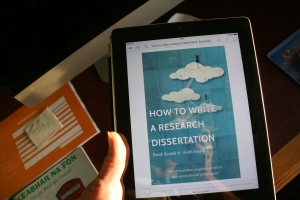One of the very first things that I say to a new PhD student, and I repeat this on several future occasions just to make sure that the point is well made, is that this research study is their project, not mine. This might seem obvious, but there are good reasons for reinforcing this realisation early in the research student-supervisor partnership. It is to be expected that any supervisor has a vested interest in getting their student(s) successfully through the PhD process. By definition, the research topic that the student becomes immersed in is of common interest to the supervisor(s), who may already have spent many years of their lives researching into similar or allied topics. In addition, supervising successfully a number of research students to gain their doctorates is looked upon as a merit-worthy academic enterprise, and success will reflect well on the career aspirations of the supervisor. Finally, although there may be other benefits, the new ideas, new ways of thinking and the “original contribution towards knowledge” of the research topic which, by definition is the mark of the PhD, should also stimulate, inspire, and breathe fresh life into the academic thinking of the supervisor(s). So, all round, there are lots of justifiable reasons why it is in the supervisor’s best interests that the research student (whom the supervisor presumably had a say in appointing) is bright, vibrant, innovative, and successful in the completion of their PhD.
There are limits, however. Although the supervisor wants the research student to write well, s/he will not write the dissertation for the student. Although the supervisor can recommend, guide, discourage one activity and encourage another, when the student walks into the final viva to defend their thesis, the student must be able argue their own case and justify their own decisions and conclusions. Some supervisors may get too close to the research topic of the student, resulting in a wish to influence it, or steer it very firmly in a different direction, and to a point this is natural. One associate of mine eventually parted company with his supervisor because the new research evidence of the student was indicating that it was beginning to undermine the views held by the supervisor over a long career. Rather than embracing the change, the supervisor sought to influence a different interpretation; the research student resisted, and was awarded his PhD in due course.
My job as a supervisor, with every student, is to listen to the thoughts of the student on the research topic, make suggestions, discuss the latest academic reading, bounce ideas off, encourage experimentation and exploratory thinking, encourage them to write down their ideas and their results, and to work together as a team to analyse what these results actually mean. I give feedback verbally, and in a written form, and while I expect the student to listen to what I have to say, I do not expect her/him to necessarily agree with everything. The final decision on what to include and what to omit from the dissertation, on how many samples or how many interviews are needed, must be the decision of the research student. They are the ones who will need to defend their decisions to the academy, not me.
The path of study for a PhD is much more about learning the process of research, and hoping at the conclusion there will be some good results which might make a difference. Above all the role of a supervisor is to help the research student learn the rules and tools of the trade, and to be supportive in the process – even if that support requires some rather blunt advice which the student does not initially welcome and means that more hard work is required!
